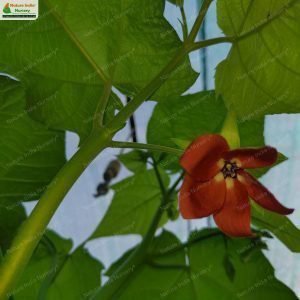Careya arborea, commonly known as the Wild Guava or Tummy Wood, is a medium-sized tree species within the Lecythidaceae family. This tree is valued for its timber, edible fruit, and medicinal properties, making it a versatile and valuable species in its native habitats. The tree’s striking features include its smooth, gray bark, which peels off in thin layers, and its clusters of white flowers, which are followed by small, edible fruit.
The fruit of Careya arborea is a key food source for various animals, and its timber is prized for its durability and resistance to rot. In traditional medicine, various parts of the tree are used to treat a range of ailments, from digestive issues to skin conditions. The tree’s adaptability and multiple uses have made it a valuable resource for many communities.
Habitat
Careya arborea thrives in a variety of environments, including dry forests, rocky outcrops, and grasslands, typically growing in well-drained soils.
Planting and Care
-
Light: Prefers full sun to partial shade, with direct sunlight promoting healthy growth and fruit production.
-
Soil: Requires well-drained soil, tolerating a range of soil types from sandy to clayey textures.
-
Watering: Regular watering is necessary, especially during the growing season, but the tree is relatively drought-tolerant.
-
Maintenance: Occasional pruning is beneficial to remove dead or damaged branches and maintain the tree’s appearance.
Additional Information
-
Timber: The tree’s timber is highly valued for its durability and resistance to rot, making it suitable for furniture-making and construction.
-
Medicinal Properties: Various parts of the tree are used in traditional medicine to treat digestive issues, skin conditions, and other ailments.
-
Ecological Significance: Careya arborea provides food and shelter for various animals, contributing to its ecosystem’s biodiversity.



